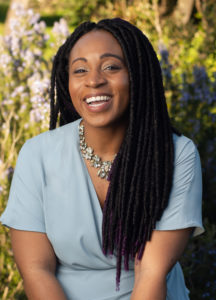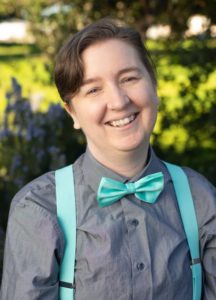Editor’s Note: LD Green and Kelechi Ubozoh are co-editors of We’ve Been Too Patient: Voices from Radical Mental Health, published by North Atlantic Books, distributed by Penguin Random House, and released July 9, 2019. In a brief interview by email, we asked them about their creation of this work.
MIA editors: What is the theme of We’ve Been Too Patient: Voices from Radical Mental Health?
Kelechi Ubozoh: Our larger theme is the concept of radical mental health, which for some in theory is not radical enough and for others it is way too outside the box. Radical mental health means encouraging individuals to reach their own understanding of their experience instead of using an existing medical framework. It is about inclusion, diversity, social justice and challenging the biomedical model. This anthology is about putting power back into the hands of people seeking mental health services, specifically about the types of interventions that we want, that we need, and that work. We deserve healing practices that are informed by what we need. How will anyone know these stories and what works if we don’t lead the conversation? It has been my personal journey to lift consciousness and raise awareness and one result is this beautiful book of voices.
LD Green: We’ve Been Too Patient is a diverse chorus of voices (in creative non-fiction, poetry, and research-based essays) from people from a variety of races, ethnicities, cultures, genders, and sexualities with lived experience of mental health issues. Our encounters with the mental health system have caused us harm—whether that’s through childhood psychiatric abuse, police brutality, electroconvulsive therapy, forced holds, and the damaging message of the biomedical model itself that those labelled “mentally ill” are biologically different from the rest of society. While some aspects of therapy may have proved useful, the recurring theme is that we have all found better solutions outside the system, including mutual aid, spirituality, creativity, activism, and the power of telling our own stories. Through these solutions and through this truth-telling, internalized stigma is undone, and stigma from the culture is challenged by bravely saying that there is nothing wrong with us, we are not “chemically imbalanced”—we may have trauma, and we are seeking recovery from it, and the biomedical model does harm. And, in the spirit of disability justice, there can be “nothing about us without us.”


MIA editors: What motivated you to edit this book?
LD Green: I wrote a series of personal essays that engaged with the topic of radical mental health for the website The Body is Not an Apology. I had been involved with The Icarus Project before that, both for mutual aid and as an organizer/advocate, and after writing some of my story and publishing it, I had a spiritual moment of calling that I knew I wanted to contribute to the radical mental health movement in a larger way. I wanted to do more with this work, but I wasn’t sure how or what to do. I had done organizing, and I had shared my own truth. This anthology is both a collective sharing of truths (and with some research-based analysis and political writing to bolster these voices) and an act of political organizing. But the organizing and truth-telling both start with the dual-celled engine of collaboration between me and Kelechi. I’m so grateful that I met her through Bay Area writing circles, and working together has been so transformative. We culled our individual communities and networks, collaborated on a vision, and assembled something powerful together.
Kelechi Ubozoh: I’ve been writing since I was very small, and when I became a reporter I fell in love with hearing other people’s stories. Reclaiming my voice was a very powerful part of my healing. Telling and owning my story helped me to release the burden of old secrets, internalized stigma and self-judgement. For this book, we wanted to hear people’s stories and have them share parts of their soulful journey to promote empathy and dispel myths. Honoring someone else’s pain and experience can be healing for that person and we as the audience gain so much insight, which is truly a gift. There is an intense desire to just pour salve on the wound and heal it, but everyone’s wounds look and feel different. What works for me may not work for L.D. What works for L.D. may not work for me. We share these diverse stories because they also contain diverse solutions. Solutions that drive us to the larger point that person-centered individualized connection and care can help undo some of the challenges of a one-size fits all approach.
MIA editors: What did you learn from the editing process?
Kelechi Ubozoh: There is something so special about working with someone to share their powerful stories, respect their experience, and maintain their voice. Editing this book taught me how listen to the words left unsaid. While being vulnerable is all the rage now, it is quite different to uncover pivotal moments that have not been shared before with a stranger. How do you make the experience safe? For me it was a balance of paying attention to the words on the page and the conversations on the phone. Not everything should be public, and navigating that is an art. It wasn’t perfect, but we have some gracious contributors who allowed us to stumble and rise.
LD Green: Oh man I learned so much. I learned about boundaries—setting them and honoring them. I learned about give and take. I learned about giving (and receiving) mutual aid and peer support to (and from) all involved in the process. I learned about being accountable when I made mistakes. I learned about how wide and various this idea of “radical mental health” is—and how it intersects with other movements for social justice. I learned how we all have to be on point in terms of uplifting and advocating for marginalized voices in this movement—whether that is for ourselves or for the people we care about, or for the people we want to stand with. I learned that not everybody agrees on everything (not everybody in the book, either), and that’s okay. I learned it’s important to seek common ground and also allow for differences. And I don’t know if this is what everybody will get from the book, but for me, I learned that cautious hope is always the best choice, for one’s own mental health, and for the sake of progress.
MIA editors: What do you hope to accomplish with the book?
LD Green: I hope we have made a document that will be a conversation starter for many who are already in the radical mental health movement. I hope this book will facilitate dialogue and deepen understanding and forge alliances between people who may or may not be familiar with each other or each other’s work in the world. I hope these dialogues will lead to movement building, a shift in the culture, and effect policy changes.
I also hope that we bring new people in to the movement. I hope people who have suffered from the mental health system find solace and comfort in the pages of our book. I hope it makes some people angry, for the right reasons—that is, I hope people who have suffered, or who have seen loved ones suffer, learn things about the patterns of oppression and abuse that lights a fire of protest underneath them. I am okay if it makes some other people angry for the wrong reasons. That is, if some people want to cling to the biomedical model and think we’re wrong to challenge it, go ahead. It’s an incredibly damaging ideology and sickeningly powerful system that supports it. We’ve Been Too Patient, and we’re not afraid to say why.
Kelechi Ubozoh: I think my biggest hope is to spark a movement for those who haven’t had these conversations or provide some validation for those who feel like they don’t quite fit the mainstream narrative.
When I first moved to California, I attended a peer-run conference by the Mental Health Association of San Francisco (MHA-SF). The director, at the time, told a sobering story of the dangers of the biomedical model of mental illness. He shared that a couple years back, clinical researchers traveled to conduct research with a nomadic African tribe. One member of the tribe experienced altered states and heard voices and hallucinated. His community widely accepted him as having spiritual gifts. However, the clinicians diagnosed him with schizophrenia and told the tribe leaders that he was sick and needed treatment. When the researchers caught up with the tribe months later, they noticed the gentleman they had diagnosed was gone. When they asked where he was, the tribe leaders said you told us he was sick, and we are a nomadic tribe and, in our culture, if someone is sick they will slow us down and we must leave them behind. They left him. This was a person who was accepted in their community and then “received help” and now was left to die because of some western ideas of “illness” and “health.” I’ll never forget this story.
The biomedical model of mental illness doesn’t take in account race, culture, environment, spirituality or identity. We need more voices, and more advocates to help bring about person-defined solutions that aren’t damaging and harmful.















I have found that the language and concepts of indigenous cultures come closest to aligning with my values as a child of the Earth, of my Mother that created and nourishes what is left of my root system.
I had an ugly cry this week when I read about the “zombie” kauri trees of New Zealand, who are connected through their root systems such that trees that are cut down act as living reservoirs for the remaining trees. My spirit died many years ago when I was cut out of the forest by medical doctors and my stump was placed on life support. I’d like to think that I was turned into a table or maybe a beautiful carved object, but in reality I am still essentially dead. My culture’s only intent with treatment was to cut me off from my roots and make an object of me – a tool to be used as the colonist does with all natural objects he doesn’t understand, such as himself.
All of our attempts to defeat nature, to remove ourselves from our origins, from our connection to spirit and soil and the forces that sustain us, they are only digging our grave as a species.
I am kauri.
Report comment
C’mon guys. “Radical mental health” is just as much an oxymoron as “green mental health.” “Mental health” and “mental illness” are both metaphors — extremely lame ones by now — and have nothing to do with healing or medicine. Must this still be pointed out almost every day???
I also note that no quotes are being used around these terms, in contradiction to the clear consensus of MIA readers supporting such a policy.
Report comment
I agree with oldhead!
Report comment
“The biomedical model of mental illness doesn’t take in account race, culture, environment, spirituality or identity.” So true, after picking up my medical records I learned that the ELCA Lutheran “holistic Christian talk therapists” are in reality Holy Spirit blasphemers, thus NOT God believers, and pathological liars. Whose real life societal function – I’ve since learned, for over a century – has been covering up child abuse for the ELCA Lutheran religion.
https://www.indybay.org/newsitems/2019/01/23/18820633.php?fbclid=IwAR2-cgZPcEvbz7yFqMuUwneIuaqGleGiOzackY4N2sPeVXolwmEga5iKxdo
https://www.amazon.com/Jesus-Culture-Wars-Reclaiming-Prayer/dp/1598868330
And turning child abuse survivors, or their concerned parents, into the “mentally ill” with the psychiatric drugs is the primary actual function of the psychiatrists.
https://www.madinamerica.com/2016/04/heal-for-life/
Perhaps the “mental health” workers should get out of the child abuse covering up business? Especially since such child abuse covering up crimes, on this type of massive societal scale, do also aid, abet, and empower the pedophiles and child sex traffickers, who are now destroying our country. Lack foresight, “mental health” workers?
https://www.amazon.com/Pedophilia-Empire-Chapter-Introduction-Disorder-ebook/dp/B0773QHGPT
“This was a person who was accepted in their community and then ‘received help’ and now was left to die because of some western ideas of ‘illness.’ That’s our “mental health” workers, always doing more harm than good. That man would likely have been made a shaman, if not for the lies of psychiatry. How sad, for both him, and likely also his tribe.
Perhaps, listening to the ‘Spirit moved’ might be wiser, than attempting to murder all of us, psychiatry and psychology? Best of luck with your book, and thanks for sharing your stories.
Report comment
*Radical Mental Health” is when a healthy people receive severe lifelong psychiatric diagnosis.
If for some this fact is not radical enough, then they have real problems with the soul.
For example how can be such a thing as “Drug induced schizophrenia”. This is nonsense. Exactly like inborn alcoholism.
In almost any article you can read something like this: “Researchers also question whether schizophrenia could be caused by drug-induced psychosis, since a correlation has been found between the two. While researchers are still trying to understand this relationship, treatment, monitoring and follow-up can help with psychosis.
Such shameless lies! Those who work in psychiatry are well know all the details, to find this information you do not need to be a researcher, it would be enough to engage in a clinic to wash the floors.
And we are still argue is it biological model or not, of course biological, man does not fly through the air and does not look like a ghost. Man and especcialy young man enters the hospital in a state of psychosis after throwing a TV out of the window, because he wants his parents not to listen to such.
However, this relationship is not fully understood.
Report comment
Radical psyche. Ego belongs to psyche, ego is not the owner or ruler of the psychological reality.
James Hillman “Re- Visioning psychology”.
Report comment
Good luck with the book!
Report comment
Psychiatry is a pseudoscience, a drug racket, and a means of social control. It’s 21st Century Phrenology, with potent neuro-toxins. Psychiatry has done, and continues to do, FAR MORE HARM than good. The DSM is a catalog of billing codes. ALL of the bogus alleged, “diagnoses” in it were INVENTED, or created, not discovered, which would be the case if they were “real”. But so-called “mental illnesses” are exactly as “real” as presents from Santa Claus, but not more real. Truth is TRUTH. And psychiatry LIES. What’s so “radical” about *that*….????….
Report comment
People should come to their own understandings by working with Comrades, on the barricades. Not with Psychiatrists, Psychotherapists, or Life-Coaches. There should be nothing of mental health or of self-improvement in it.
Report comment
^^^^ I think people need their own spiritual practices. Daily practice. Can be drawn from multiple and heterogeneous sources.
Far better than confessing your thoughts to a therapist.
Report comment